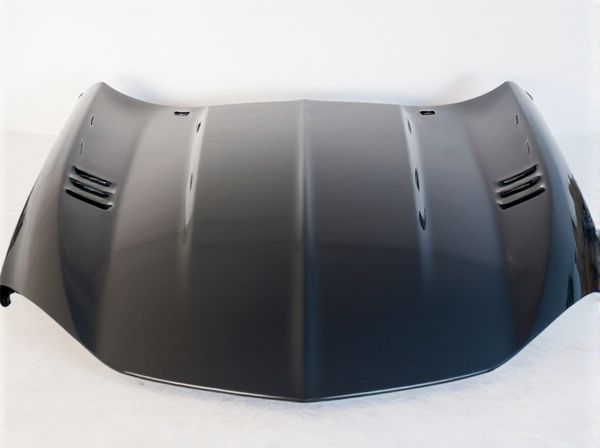
Photo illustration: Custom Hood vs OEM Hood
Choosing between a custom hood and an OEM hood depends on your vehicle's needs and personal style preferences. A custom hood offers unique designs, enhanced performance features, and materials tailored for weight reduction or improved airflow, while an OEM hood provides guaranteed fitment, factory-quality materials, and maintains your vehicle's original appearance. Your decision should balance aesthetics, functionality, and budget to ensure the best upgrade for your ride.
Table of Comparison
| Feature | Custom Hood | OEM Hood |
|---|---|---|
| Material | Varies (carbon fiber, fiberglass, aluminum) | Standard factory-grade steel or aluminum |
| Fit & Compatibility | May require modifications for fit | Exact fit, designed for specific vehicle model |
| Design & Style | Unique, performance-oriented, customizable | Factory-standard design, uniform appearance |
| Durability & Strength | Depends on material choice | Tested for crash safety and durability |
| Price | Typically higher, varies by material and brand | Generally lower, mass-produced |
| Warranty | Varies by manufacturer | Backed by vehicle manufacturer warranty |
| Installation | May require professional installation | Easier installation, fits directly |
Introduction to Custom and OEM Hoods
Custom hoods are aftermarket vehicle components designed to enhance performance, style, and uniqueness, often featuring specialized materials like carbon fiber or aluminum for weight reduction and improved airflow. OEM hoods, produced by the original vehicle manufacturer, guarantee precise fitment, factory-grade materials, and maintain the vehicle's warranty and original aesthetic. Choosing between custom and OEM hoods depends on priorities such as performance upgrades, personalization, or maintaining factory specifications.
Key Differences Between Custom and OEM Hoods
Custom hoods offer unique designs, materials, and finishes tailored to individual preferences, often enhancing vehicle performance or aesthetics beyond factory specifications. OEM hoods are manufactured to exact vehicle specifications, ensuring perfect fit, factory-grade materials, and maintained safety standards. Key differences include customization level, material variety, cost, and installation complexity, with custom hoods providing more personalization and OEM hoods guaranteeing original manufacturer quality and compatibility.
Material Comparison: Custom vs OEM Hoods
Custom hoods often use materials like carbon fiber, fiberglass, or aluminum to reduce weight and enhance performance, whereas OEM hoods are typically made from stamped steel or fiberglass for durability and cost efficiency. Carbon fiber custom hoods provide superior strength-to-weight ratio, improving vehicle handling and fuel economy compared to heavier OEM steel hoods. However, OEM hoods offer better resistance to corrosion and impact, making them more practical for long-term use and daily driving conditions.
Design and Aesthetic Options
Custom hoods offer extensive design and aesthetic options, allowing for unique shapes, vents, and materials tailored to individual preferences and vehicle style. OEM hoods prioritize factory specifications, ensuring a perfect fit and maintaining the original look and aerodynamics of the vehicle. Custom hoods often enhance visual appeal with aggressive or sleek designs, while OEM hoods preserve the authentic appearance valued by purists.
Performance Benefits of Custom Hoods
Custom hoods offer enhanced performance benefits compared to OEM hoods by improving engine cooling through optimized ventilation and heat extraction designs. These hoods often use lightweight materials such as carbon fiber or aluminum, reducing overall vehicle weight and enhancing acceleration and handling. Custom hoods also provide increased clearance for aftermarket engine components, enabling better fitment of performance parts and improved airflow dynamics.
Fitment and Compatibility Issues
Custom hoods often require precise measurements and adjustments to ensure proper fitment, as they are designed for aesthetic appeal or performance enhancements rather than exact factory specifications. OEM hoods guarantee compatibility with the vehicle's mounting points, latch mechanisms, and alignment, reducing installation challenges and potential gaps or misfits. Improper fitment of custom hoods can lead to wind noise, water leaks, and interference with engine components, posing significant compatibility concerns compared to OEM options.
Cost Analysis: Custom vs OEM Hoods
Custom hoods typically cost 20-50% more than OEM hoods due to specialized materials and labor-intensive manufacturing processes. OEM hoods offer consistent pricing, often ranging between $200 and $600 depending on vehicle make and model, benefiting from mass production economies. While custom hoods provide unique styling and materials like carbon fiber or fiberglass, the increased expense must be weighed against budget constraints and desired performance features.
Durability and Longevity
Custom hoods often use high-quality materials like fiberglass or carbon fiber, offering enhanced durability and resistance to corrosion compared to many OEM hoods made from stamped steel or aluminum. OEM hoods are engineered to meet strict manufacturer standards, ensuring consistent fit and structural integrity, which contributes to reliable longevity under typical driving conditions. Investing in a custom hood can improve strength and longevity in harsh environments, while OEM hoods provide proven endurance through standardized manufacturing and rigorous testing.
Installation Process and Requirements
Custom hoods often require more precise fitting and potential modifications to the vehicle's frame or mounting points during installation, demanding specialized tools and expertise. OEM hoods are designed to match exact factory specifications, allowing for straightforward installation with standard hardware and minimal adjustments. Proper alignment, secure fastening, and attention to sensor placements or under-hood components are critical for both, but OEM options typically reduce installation time and complexity.
Which Hood is Right for You?
Choosing between a custom hood and an OEM hood depends on your vehicle's needs and personal preferences. Custom hoods offer unique designs, enhanced ventilation, and performance benefits tailored to specific driving conditions or aesthetics. OEM hoods ensure perfect fitment, original manufacturer quality, and maintain the vehicle's resale value, making them ideal for those seeking reliability and factory standards.
 caratoz.com
caratoz.com